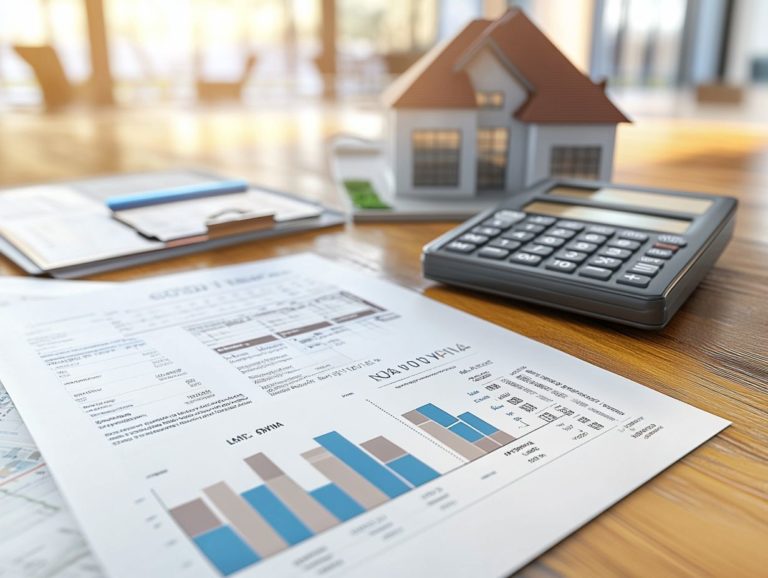The Pros and Cons of a 15-Year Mortgage
Deciding on a mortgage is a significant financial choice, and understanding the various options available to you is essential.
A 15-year mortgage can be an appealing alternative to the traditional 30-year plan. It offers quicker payoff and potential savings. However, it does come with higher monthly payments and less flexibility in your budget.
This article explores what a 15-year mortgage entails, weighing its advantages and disadvantages to help you determine if it s the right fit for your financial situation. You will also explore other options.
Keep reading to make a confident choice!
Contents
- Key Takeaways:
- Understanding 15-Year Mortgages
- The Pros of a 15-Year Mortgage
- Alternatives to a 15-Year Mortgage
- Frequently Asked Questions
- What is a 15-year mortgage and how does it differ from a traditional 30-year mortgage?
- What are the pros of a 15-year mortgage?
- What are the cons of a 15-year mortgage?
- Is a 15-year mortgage a good choice for everyone?
- Can a 15-year mortgage be refinanced?
- Are there any alternatives to a 15-year mortgage?
Key Takeaways:

A 15-year mortgage offers a faster payoff and lower interest rates, allowing homeowners to build equity and save money in the long run. However, this comes with the trade-off of higher monthly payments and less budgeting flexibility. When considering a 15-year mortgage, weigh factors such as income stability and long-term financial goals. Other mortgage options may also be worth exploring.
Understanding 15-Year Mortgages
Understanding 15-year mortgages is crucial for you as a homebuyer aiming to make informed financial choices and achieve your financial goals.
This mortgage option offers a shorter loan term than the more typical 30-year mortgage. This leads to higher monthly payments but potentially substantial interest savings over time.
Plus, the fixed-rate mortgage feature allows you to lock in a consistent interest rate, providing needed stability for your budgeting and cash flow management.
By focusing on building home equity the portion of your home that you own outright and minimizing total interest paid, a 15-year mortgage can align seamlessly with your diverse financial strategies, whether it’s enhancing your retirement savings or investing in home improvements.
What is a 15-Year Mortgage?
A 15-year mortgage is a home loan that allows you to repay both the principal balance and interest over a fixed term of 15 years. This structure provides a clear timeline for your mortgage payments.
This type of mortgage typically comes with a fixed-rate option, meaning your interest rate stays the same throughout the loan’s life, allowing for predictable monthly payments. You can benefit significantly from these fixed rates, as they often result in lower overall interest costs compared to longer-term mortgages.
With a shorter loan term like the 15-year mortgage, you ll accelerate your equity accumulation, enabling you to build ownership in your property more swiftly.
As a result, these loans help reduce your interest expenses and enhance your financial security, putting you on a more efficient path to achieving your homeownership goals.
The Pros of a 15-Year Mortgage
Choosing a 15-year mortgage offers several compelling advantages. You ll enjoy faster payoff times, lower interest rates, and the opportunity to build equity more rapidly.
This makes it an appealing choice for the financially savvy homebuyer looking to maximize their investment.
Faster Payoff and Lower Interest Rates
One of the most compelling benefits of opting for a 15-year mortgage is the accelerated path to payoff. This allows you to eliminate debt sooner and establish financial stability more rapidly.
This quicker repayment schedule not only shortens the loan term but also results in significant interest savings over the loan’s life. For instance, if you take out a $300,000 mortgage at a 3% interest rate for 15 years, you could save tens of thousands compared to a traditional 30-year mortgage at the same rate, where interest accrues for twice as long.
In fact, with a shorter loan term, you typically enjoy lower interest rates, enhancing the financial advantages even further.
While your monthly payments may be higher, the overall cost of borrowing decreases substantially, making this an enticing option for those looking to invest in their future without excessive financial strain.
Don t miss out on the chance to save significantly on your mortgage. Explore your options today and take the first step towards financial freedom!
Building Equity and Saving Money

Building equity swiftly is one of the standout benefits of a 15-year mortgage. With those higher monthly payments, you’re not just paying the bank; you’re making significant strides in reducing your principal.
This reduction translates to increased home value over time. This accelerated payment schedule means you can look forward to seeing your property appreciate at a faster rate compared to those locked into longer loan terms.
With a larger equity stake, you have more leverage for home improvements, enhancing both your property’s market appeal and your comfort within it.
From a financial planning perspective, this rapid equity growth opens doors for ways to change your mortgage for better terms, investment opportunities, or even a more robust retirement plan.
Ultimately, opting for a 15-year mortgage can be a savvy move, giving you the power to build wealth while paving the way for a more secure financial future.
The Cons of a 15-Year Mortgage
While a 15-year mortgage offers clear benefits, it also presents certain drawbacks.
You may encounter higher monthly payments that could strain your budget and limit your financial flexibility, especially if you’re navigating potential financial challenges.
Higher Monthly Payments
One significant drawback of a 15-year mortgage is the higher monthly payments, which can put a strain on your budget and impact overall affordability. This financial pressure may prompt you to rethink your long-term goals.
As a potential borrower, it’s crucial to evaluate your entire financial landscape, including your income stability and existing obligations. By assessing your comfort level with monthly commitments, you can better determine a loan amount that suits your situation.
Establishing a well-thought-out budget is essential, ensuring you factor in these payments alongside your savings and discretionary spending. This approach will help you maintain a balanced financial outlook.
Less Flexibility in Budgeting
With a 15-year mortgage, you might find yourself facing less flexibility in your budgeting due to those larger monthly payments. This can constrain your ability to save for other important financial goals.
This rigidity may put a strain on your cash reserves, making it challenging to set aside funds for emergencies, retirement, or even that dream vacation.
For example, if you’re managing a tight budget, you might struggle to make adequate contributions to a college savings plan for your children. A significant portion of your income is tied up in the mortgage, making unexpected expenses, like car repairs or medical bills, amplify your financial stress.
Evaluate your financial strategy carefully before committing to a rigid mortgage. These tight monthly obligations could impede your aspirations, whether it’s investing in property or planning for a comfortable retirement.
Is a 15-Year Mortgage Right for You?
Let s dive into what matters most! Determining if a 15-year mortgage aligns with your financial aspirations requires a careful evaluation of several key factors.
Consider your financial goals, your retirement savings plan, your credit score, and the loan requirements, which can differ among mortgage lenders. Each of these factors is crucial don t wait to explore your options!
Factors to Consider

When you re contemplating a 15-year mortgage, it s crucial to align this decision with your financial goals.
Assess your retirement savings strategy, check your credit score, and understand the loan requirements from various mortgage lenders.
Evaluating how a shorter loan term can significantly reduce your overall interest payments is essential, especially if you re eager to build equity quickly or pay off your home before retirement.
If you’re aiming for financial freedom, prioritizing this option might allow for greater disposable income to invest or enjoy leisure activities later in life.
Consulting with a financial planner can provide you with tailored insights, guiding you through the complexities of your unique situation.
A strong credit score can enhance your mortgage application, potentially unlocking better rates for you.
By considering these factors, you can make informed choices that not only meet your immediate needs but also contribute to your long-term financial stability.
Alternatives to a 15-Year Mortgage
A 15-year mortgage has notable benefits, but you should also consider alternative mortgage options such as a 30-year mortgage or refinancing. This can help you discover the ideal solution tailored to your financial circumstances and goals.
Other Mortgage Options
If you’re buying a home, you may want to explore a variety of mortgage options, including the well-regarded 30-year mortgage.
This choice often presents the advantage of lower monthly payments and a longer loan term compared to a 15-year mortgage.
While the allure of the 30-year option lies in its short-term affordability, it is essential to recognize the trade-off: higher interest costs over the life of the loan.
If you re considering alternatives, the 15-year mortgage might catch your eye, especially for its quicker payoff and lower overall interest rates, though it does come with heftier monthly payments.
Don t overlook refinancing options; they could potentially lower your monthly payments or grant you access to more favorable rates over time, giving you the power to make strategic financial decisions.
Understanding these nuances is crucial in ensuring that your choices align seamlessly with your long-term financial aspirations.
Frequently Asked Questions
What is a 15-year mortgage and how does it differ from a traditional 30-year mortgage?
A 15-year mortgage is a home loan that is paid off over a period of 15 years, compared to a traditional 30-year mortgage, which is paid off over 30 years.
The main difference is the length of the loan, resulting in different pros and cons for borrowers.
What are the pros of a 15-year mortgage?

One of the main pros of a 15-year mortgage is the lower interest rate.
This means you will end up paying less interest over the life of the loan compared to a 30-year mortgage.
Another advantage is that you will build equity faster, allowing you to own your home outright in a shorter amount of time.
What are the cons of a 15-year mortgage?
One of the main cons of a 15-year mortgage is the higher monthly payments.
Since the loan is paid off in a shorter period, the monthly payments will be higher compared to a 30-year mortgage.
This could make it more difficult for some borrowers to afford the mortgage, especially if they have other financial obligations.
Is a 15-year mortgage a good choice for everyone?
No, a 15-year mortgage is not a one-size-fits-all solution.
It may be a good choice for those who can comfortably afford the higher monthly payments and are looking to pay off their home quickly.
However, it may not be a viable option for those who have other financial priorities or are looking for flexibility in their monthly budget.
Can a 15-year mortgage be refinanced?
Yes, a 15-year mortgage can be refinanced just like a traditional 30-year mortgage.
However, keep in mind that refinancing may result in additional fees and closing costs, so it’s important to carefully evaluate whether it makes financial sense for your situation.
For personalized advice, consider consulting a financial planner or mortgage advisor today!
Are there any alternatives to a 15-year mortgage?
Looking for ways to save money on your mortgage? Yes, there are several alternatives to a 15-year mortgage.
Some people pay more than their monthly mortgage on a 30-year loan to pay it off sooner. Others prefer a 20-year or 25-year mortgage for a balance between lower monthly payments and a shorter loan term. Talk to a mortgage lender to explore your options and find the best fit for your financial goals. Don t wait discover your mortgage options today!






